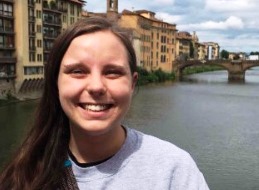
Jordan Holloway, a first-year student at the Wayne State University School of Medicine, was awarded the Association of American Medical Colleges' Central Group on Educational Affairs 2017 Student Travel Award to attend and present a WSU collaborative service-learning project at the organization's regional spring meeting to be held March 29-31 in Chicago.
Holloway will present "Increasing Medical Students' Understanding of the Struggles Faced by Families with a Child with a Developmental Disability," a collaboration between the medical school and the Michigan Developmental Disabilities Institute at WSU, in the meeting's Innovation in Medical Education oral session.
The meeting is hosted by the Northwestern University Feinberg School of Medicine. Nearly 75 abstracts were submitted to the Innovation in Medical Education category, with only 14 percent of those invited to give an oral presentation. She will receive the $600 travel award at a meeting luncheon March 31.
The abstract is about the results of a home-visit program in which medical students in groups of two or three visit homes and interact with families of children with developmental disabilities, to learn how this impacts their family dynamics, medical needs and other unique challenges.
Holloway was the project's first-year coordinator for this year's program. She organized groups and helped analyze data and write abstracts. Second-year medical students Molly Belisle and Kate Dobesh, and Assistant Professor and Director of CoCurricular Programs Jennifer Mendez, Ph.D., helped write the abstract. First-year medical students Christine Klingert and Miles Hudson helped coordinate and gather data.
"The overall idea is that by exposing future doctors to individuals with developmental disabilities, they will become more comfortable and knowledgeable about this population, which would better prepare them for their future medical practice," Holloway said.
The students used two surveys to measure student perceptions of disability and levels of empathy, and were able to demonstrate that there is a significant increase in comfort around this population after participation.
"My involvement with individuals with special needs really spurred my involvement with this program. I know very personally how exposure to people with developmental disabilities can change both how you see those people and how you interact with the world. So I wanted to be involved in helping others have that experience," she said. "This is a unique program because we can demonstrate its efficacy and it takes place in the family home, which is more comfortable for the families and helps ease the burden of transportation."
Although the submitted abstract was based on last year's program data, Holloway's talk will include a discussion about having a random selection of students assigned to the program this year through the School of Medicine's Service Learning Initiative.
"In self-selection, students are often drawn to participate because of former experience with individuals with developmental disabilities. I was drawn to it because I tutored individuals with autism and worked at a summer camp for individuals with special needs throughout high school," Holloway said. "We hypothesized that there might be a more robust change, demonstrated by the data, by looking at our self-selected group versus the randomly-assigned group from Service Learning, who may or may not have spent time around this population. We found that to be true. The assigned group scored significantly lower than the self-selected group in measures of empathy prior to the program, and then demonstrably increased their measures to the level of the self-selected group in post-testing."